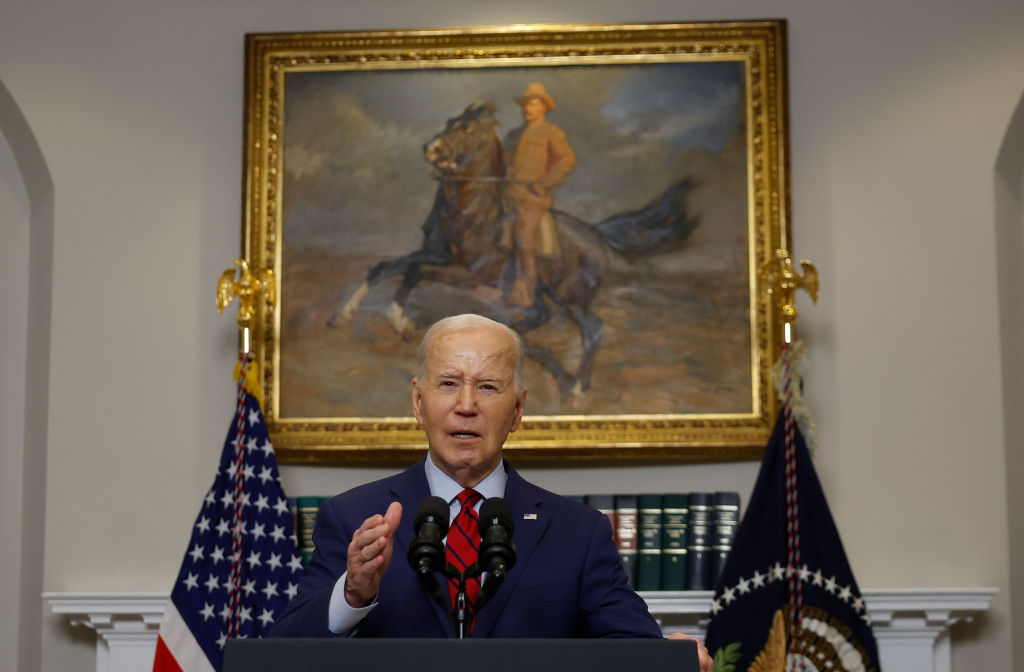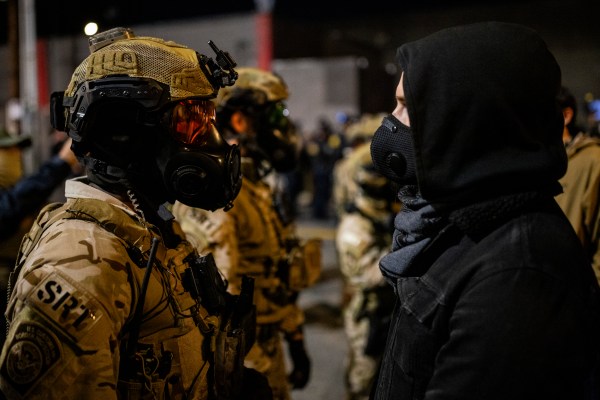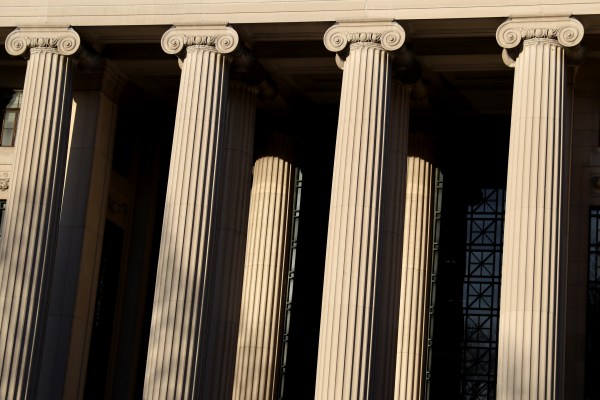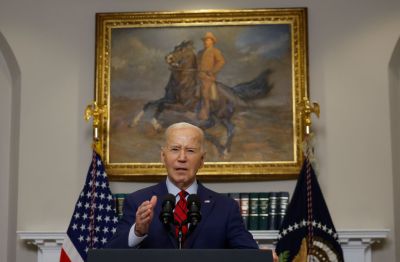Happy Friday! We would like to send our condolences to the family of New Jersey Rep. Donald Payne Jr., who died last week after suffering a heart attack. At his Thursday funeral, fellow members of Congress remembered him as a dedicated and well-dressed representative.
Up to Speed
- Former President Donald Trump will attend the Libertarian Party’s national convention later this month, he announced Wednesday. “If Libertarians join me and the Republican Party, where we have many Libertarian views, the election won’t even be close,” Trump said in a statement. “We cannot have another four years of death, destruction, and incompetence. WE WILL WORK TOGETHER AND WIN!” Third-party candidates have received significant attention this cycle. As Trump courts the Libertarian vote, both he and the Biden campaign have attacked independent candidate Robert F. Kennedy Jr., whom Republicans and Democrats fear could draw votes away from their respective candidates.
- Speaking of Biden, the White House hired campaign operative Greg Hale—a veteran of Democratic politics who has worked on multiple presidential races—as its director of presidential production, the Hill reported Wednesday. Hale worked on President Bill Clinton’s 1996 reelection campaign, as well as the unsuccessful presidential runs of Al Gore, John Kerry, and Hillary Clinton. Hale is especially experienced in creating backdrops and optics for presidential events, and his hiring comes as the White House has ramped up Biden’s travel schedule.
- Biden’s White House has also made a key hire on border security, bringing on Department of Homeland Security Assistant Secretary for Border and Immigration Policy Blas Nuñez-Neto, Axios reported Friday. Though it is unclear exactly when the move will take place, it represents a beefing up of White House staff on the issue of border security, as Republicans have slammed Biden on illegal immigration ahead of the 2024 election. Nuñez-Neto played a central role in the January negotiation of the bipartisan Senate deal that tied aid to Ukraine, Israel, and Taiwan to measures on border security, which House Republicans and Trump killed.
- The Justice Department is preparing to announce an indictment of Rep. Henry Cuellar, NBC News first reported Friday morning. The home of the Texas Democrat was raided in January 2022 as part of an investigation into dealings between American businessmen and the central Asian country of Azerbaijan. While it’s unclear what the charges are, Cuellar issued a statement asserting his innocence and pledging to continue running for reelection to an 11th term in his district, which stretches from San Antonio to the southern border with Mexico.
- Arizona Gov. Katie Hobbs signed a repeal of her state’s near-total abortion ban Thursday, making the 15-week limit approved by then-Gov. Doug Ducey in 2022 the law of the land. The Arizona Supreme Court sparked a firestorm earlier this month when it ruled that the now-repealed ban, passed in 1864, was the legitimate law on the books, leaving Republicans in the state scrambling to distance themselves from it. The repeal has also divided Republicans in the primary for the state’s deep-red 8th Congressional District, which includes state House Speaker Ben Toma, indicted “fake elector” state Sen. Anthony Kern, failed attorney general candidate Abe Hamadeh, and failed Senate candidate Blake Masters.
- In congressional news, a Republican primary candidate in North Carolina’s 13th District withdrew from the race Thursday after Trump endorsed her opponent. “In light of President Trump’s endorsement of Brad Knott for the congressional seat in District 13, it has become clear that a pathway to victory is no longer feasible,” Kelly Daughtry said in a Thursday statement. Daughtry had finished first in the March primary election, but she did not reach the 30 percent threshold to clinch the nomination, setting up a May 14 runoff between her and second place finisher Knott.
Biden Attempts to Thread the Needle in Discussing Campus Unrest

President Joe Biden delivered brief remarks Thursday at the White House to call for “moral clarity” about the ongoing protests of Israel’s war in Gaza to eliminate Hamas occurring at university campuses across the country.
“This isn’t a moment for politics. This is a moment for clarity,” he said from a podium in the Roosevelt Room. “Violent protest is not protected. Peaceful protest is.”
Biden listed several actions taken by student protesters at campuses such as Columbia University and UCLA that he identified as not peaceful: “Destroying property … vandalism, trespassing, breaking windows, shutting down campuses, forcing the cancellation of classes and graduation … threatening people, intimidating people, instilling fear in people.” He also said there should be “no place” on campuses or in America for antisemitism or violence against Jewish students.
Despite Biden downplaying the politics of the moment, the short address comes as the progressive wing of the president’s coalition continues to demand the administration change its policy of supporting Israel. The unrest on campuses is the bleeding edge of left-wing discontent with the Democratic president, and his reelection could hinge on both young voters and Arab American voters who are opposed to American diplomatic and military support for Israel.
Yet Biden is also seeking to assure Americans in the center that he deserves a second term, and the association of the violent campus demonstrations with the political left poses a particular risk.
“He’s between a rock and a hard place,” Dane Strother, a Democratic political consultant, told Dispatch Politics. “There is no perfect solution given how spread out the protests are.”
The vast majority of the country remains broadly supportive of Israel. A recent Harvard/Harris poll found 80 percent of registered voters say they support Israel more than Hamas, and 56 percent said they supported the additional $26 billion in supplemental aid to Israel recently passed by Congress. Additionally, 80 percent said that students who call for violence against Jewish students should be suspended from their colleges and universities.
But a new YouGov poll that breaks down views by party shows why things are complicated for Biden.
Among all adults, 47 percent say they either strongly or somewhat oppose the pro-Palestinian protests on campuses, with just 28 percent saying they either strongly or somewhat support them. But those numbers are basically reversed among Democrats, with 46 percent saying they strongly or somewhat support the protests and just 31 percent saying they strongly or somewhat oppose them. Yet in his remarks on Thursday, Biden was likely trying to target the independents, 44 percent of whom say they oppose the protests, with just 24 percent saying they support them.
The Biden campaign did not reply to a request for comment.
Biden’s speech attempted to differentiate the American tradition of free speech, free expression, and dissent with the violence being seen on campuses. He also put his own spin on a favorite phrase of his Republican opponent, Donald Trump, during times of unrest: law and order.
“Peaceful protest is in the best tradition of how Americans respond to consequential issues,” Biden said. “But neither are we a lawless country. We are a civil society, and order must prevail.”
Mark Mellman, a veteran Democratic consultant and the founder of Democratic Majority for Israel, told Dispatch Politics the speech accomplished what Biden needed to do in this moment.
“I think he’s been very clear, very direct in defending the right to peacefully protest but in making clear that these demonstrations have crossed some very important lines,” Mellman said. “And he’s made clear that he’s not changing his policy in the Middle East.”
Indeed, when asked Thursday by a reporter if the protests had “forced” him to “reconsider” his policy toward Israel, Biden answered with a curt “no” as he turned away from the cameras.
That answer will no doubt frustrate the sort of people setting up encampments on college lawns to urge their institutions to divest from Israel and for U.S. foreign policy to change. But Biden is likely recognizing the political reality that violent demonstrations turn off more Americans than convince them.
“Politically, it puts him in the same place as most people,” said T.J. Rooney, the former chairman of the Democratic party in Pennsylvania, a key swing state. “Protest all day long but when you break s—t, you own it.”
Bipartisan Resolve Beats Lobbyists, Teens, and Trump
There’s something remarkable about the enactment last week of a new federal law to force a Chinese-owned company to divest from the social media giant TikTok or face a ban on operating in the United States. For the first time in, well, a while, a bipartisan coalition in Congress came together to pass a significant piece of legislation to solve a problem that many in Washington had been discussing for years.
On the site today, John McCormack and David M. Drucker took a deep dive into just how incredible the path for the TikTok divestment bill was.
But what looked quick and easy was actually the culmination of a hard, yearslong process that required deft legislative maneuvering until the very end to overcome powerful forces from across the political spectrum allied to TikTok. The multibillion-dollar social media app had a well-funded and well-connected army of lobbyists. Democrats had reason to fear alienating the TikTok-addicted youth vote in a presidential election year, and influential voices on the right, including Tucker Carlson, Elon Musk—and eventually Donald Trump himself—turned against legislation to end the Chinese control of TikTok.
Congressional Democrats and Republicans tell The Dispatch the bill is now law of the land because of painstaking negotiations and legislative wrangling that saw top Democrats and Republicans, and the Biden administration, quietly working together.
“It took about a year to really negotiate. It required tremendous stakeholder input from around Congress,” Democratic Rep. Raja Krishnamoorthi, who co-sponsored the legislation with former Wisconsin Rep. Mike Gallagher, a Republican, told The Dispatch.
There were plenty of tactical errors by TikTok in its efforts to protect itself, including an ill-advised campaign to have its young users contact their representatives in Congress, which only seemed to harden support for the bill. Support for the legislation materialized in part because lobbyists for TikTok were caught flat-footed, all thanks to the group of bipartisan lawmakers keeping their negotiations on the bill under wraps.
But, as McCormack and Drucker write, where there was bipartisan agreement, there was also bipartisan opposition, from Democrats wary of alienating young voters to some token resistance from the GOP’s figurehead:
Even as the TikTok preteens were harming their cause, a potentially more significant voice emerged that seemingly could have helped the social media giant. “If you get rid of TikTok, Facebook and Zuckerschmuck will double their business,” Donald Trump wrote on Truth Social on March 7. “I don’t want Facebook, who cheated in the last Election, doing better. They are a true Enemy of the People!”
But House and Senate Republicans who supported the TikTok measure and are on good terms with Trump tell The Dispatch the former president never lobbied their GOP colleagues to oppose the legislation. None of the direct, chit-chatty phone calls Trump is known for, no belligerent badgering on social media. Nothing. And that was significant, senior Republicans say, because it meant the presumptive GOP presidential nominee’s opposition was not an obstacle when cajoling rank-and-file Republicans to stick with the bill.
“I don’t think Trump did anything at all,” a knowledgeable GOP House aid said, requesting anonymity to speak candidly. “I never heard of him calling anyone.”
Be sure to read the whole thing here.
Notable and Quotable
“Contrary to the FAKE NEWS MEDIA, I don’t fall asleep during the Crooked D.A.’s Witch Hunt, especially not today. I simply close my beautiful blue eyes, sometimes, listen intensely, and take it ALL in!!!”
—Former President Donald Trump in a Truth Social post responding to reports that he has fallen asleep multiple times during his hush money trial, May 2, 2024








Please note that we at The Dispatch hold ourselves, our work, and our commenters to a higher standard than other places on the internet. We welcome comments that foster genuine debate or discussion—including comments critical of us or our work—but responses that include ad hominem attacks on fellow Dispatch members or are intended to stoke fear and anger may be moderated.
With your membership, you only have the ability to comment on The Morning Dispatch articles. Consider upgrading to join the conversation everywhere.